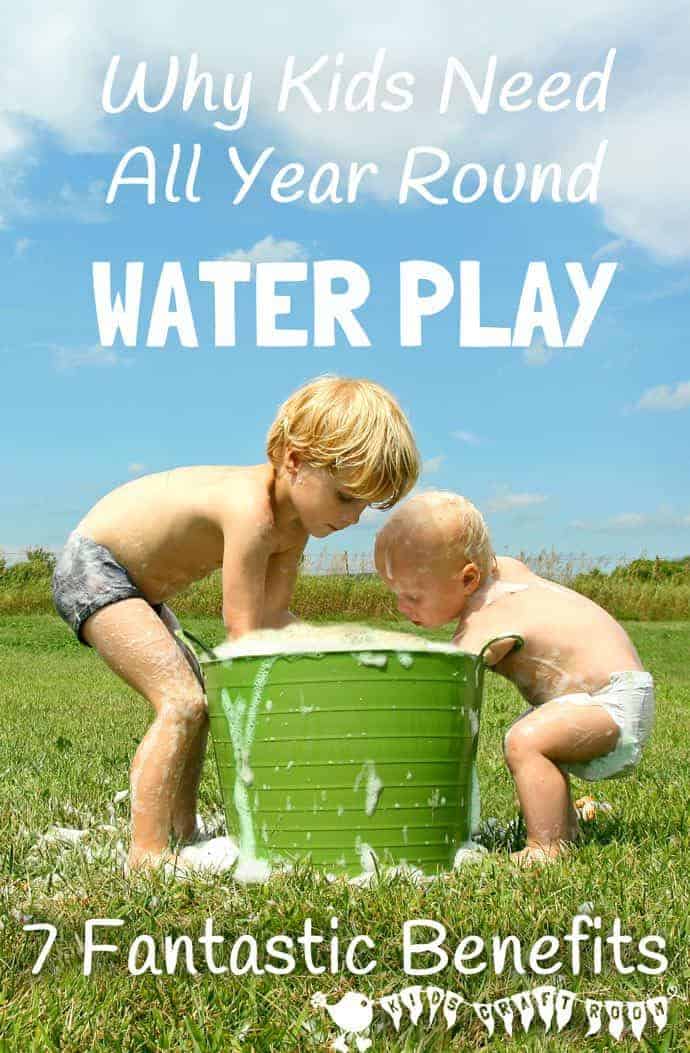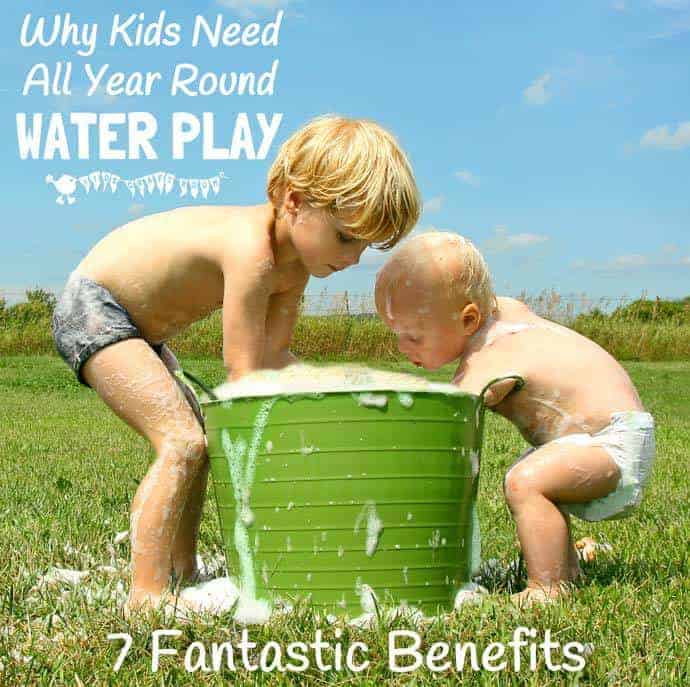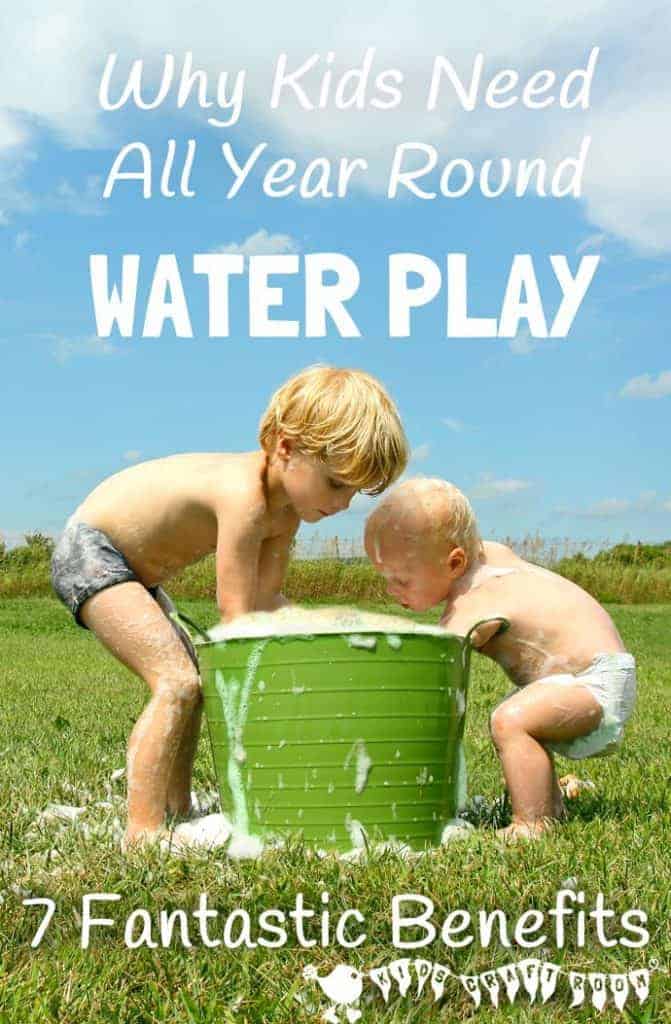We love encouraging kids to play, be it outside play, windy weather play or water play. But what are the benefits of water play for kids? Why does water play have such a prominent place in nurseries or preschool settings? Why should we be providing regular water play within the home throughout the whole year?
Water is an important natural material that provides hours of absorbing fun and a multitude of wonderful development and learning opportunities. Discover the full benefits of water play and tips to easily incorporate it into your day to day play schedule. It’s exciting to know that water play offers so much value and will give your child a great early start to learning through fun hands-on play.

What Are The Benefits Of Water Play?
1. Water Play Releases Energy
Children can find water play both calming or invigorating depending on the activity being presented. Vigorous splashing and kicking and running around in the water can be an excellent outlet for pent up energy. A great way for kids to have fun and let off steam!
2. Emotionally Therapeutic Water Play
Water play doesn’t have to be loud and busy, it can be a tranquil activity where children are quietly absorbed. A bit like losing yourself in a colouring page, children benefit from the relaxing and repetitive nature of scooping, pouring and running their hands through the water. Much like grown ups enjoying relaxing in a warm bath, children can lose themselves in the physical repetition of gentle water play, allowing them to unwind, order their thoughts and relax.
3. Develop Motor Skills With Water Play
Water play gives many opportunities to develop gross and fine motor skills across the age ranges. You only have to look at a young baby when they are shown water pouring in front of them, they will reach out to feel the trickle and try to capture the flow with whole hand grasps and then with early pincer grip movements and so the development continues to grow as they do.
Fine motor skills and hand and eye coordination are constantly refined as children scoop and pour water and fill and empty containers in a multitude of different ways.
Gross motor skills and large muscle strength is developed and stretched as children are encouraged to carry and pour larger and heavier pots and buckets of water. The opportunity to use a wading pool or to go swimming is a fantastic way to develop core strength and co-ordination and stamina across all the large motor groups as children kick, splash and sweep their arms and hands through the water.
4. Develop Social Skills Through Water Play
Water play gives many opportunities for children to develop crucial social skills when they are working with just one other child or a whole group. It is a great way for children to learn to share and take turns as they share the physical space and the play items in the water.
Water play can be an avenue for children to take their first steps from “playing alongside someone” to actually “playing with someone” as they follow other children’s ideas and join in with them, or likewise initiate an idea themselves. It could be a simple task like working together to fill a bucket with scoops of water from small cups. This team work and co-operation are important steps to developing the skills needed for friendships in the future.
5. Building Language And Communication With Water Play
Water play is so versatile you can add pretty much any play items to it, be it dinosaurs and mud for a swamp or cars, sponges and bubbles for a car wash, the possibilities are endless! Of course each new way of playing with water brings with it new vocabulary choices for all the play items and play scenarios involved, as such, it is a fantastic resource for building new vocabulary.
As well as developing lots of new vocabulary children can practise communication and language skills as they play with water. Even when playing alone young children will often narrate the play situation out loud, practising stringing words together and building sentence structure. When playing with or alongside others children can practise turn taking and listening in conversations too.
6. Water Play Can Stimulate Creativity and Imagination
We’ve already chatted about the versatility of water play in Language and Communication above, as parents and early years practitioners we can use this versatility to provide rich and valuable play experiences to develop and stretch children’s imagination and creativity.
Think about regularly changing the play items to go with water to stimulate children’s discovery in new ways. Easy ways to change water play instantly is to add colour with food dye or add bubbles with dish soap or bubble bath.
Vary the size of the pouring materials regularly and offer a variety of different play items to add to the water, perhaps small world play, vehicles, boats, bricks, anything goes.
Some of our favourite Water Play Toys
Offering children some unusual items to add to water can be a great way to stimulate their investigation and they will often take the play in unusual and unexpected ways. How about adding some cardboard containers that will soften and disintegrate as children play or natural items like buck eyes, pine cones, or flour? There are so many ways to add interest!
7. Water Play Promotes Cognitive Development
Water play offers many opportunities for children to problem solve, question, explore and experiment. They may be investigating water science, finding out what floats and sinks, or how water moves a water wheel. They may be building their understanding of the properties of water and discovering that water flows downhill and will find a horizontal level. They may be developing math skills and estimating how many small pots of water it takes to fill a large bucket. They may be exploring measurements on the side of a jug and learning mathematical terms like “more than” or “less than”.
Water play can come in so many different forms and each new water based activity offers the potential to develop and consolidate learning in lots of exciting ways.
How To Make Water Play Manageable Every Day?
Setting up play activities with water is often easiest when the sun is shining and we have an outdoor space but this shouldn’t mean that we are not accessing water play at other times too.
Water play can be something that’s enjoyed everyday inside or out whatever the weather and whatever the space available. It doesn’t have to be a fancy water table or wading pool. Children can get just as much benefit from playing at a sink or in the bath or with a bucket or bowl of water on the floor.
Don’t let the idea of a wet mess or lack of space put you off. A top tip to protect the floor is to cut open a plastic trash bag and lay it on the floor with a towel over it and let your little one have a washing up bowl just half full of water on top of that. And don’t forget that the bath can be used for all sorts of water play ideas too.
Children benefit so much from water play. It’s a wonderful play resource that children can explore and experiment with in their own way. By offering a variety of water based experiences and letting children follow their own ideas we can encourage their natural curiosity which will lead to a whole range of valuable learning, experimenting and discovery.

More Exciting Ideas To Try:

